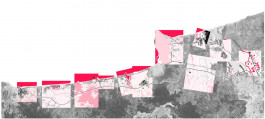The Territory of the Grand Tetouan as Linear City: Between Description and Project
Victor Brunfaut & Bertrand Terlinden
Laboratoire Habiter
This article, based upon pedagogical experimentation in development in a master-level architecture studio at the ULB School of Architecture (Brussels), focuses on the concept of a linear city in a metropolitan context. This concept is proposed by the Grand Tetouan (North Morocco) spatial development scheme as a framework to think about the future of this territory. The interest of the concept lies in its being both a descriptive and project-oriented tool, which allows working with students on the intricate relationship between these two moments of urban design. The coastal region has been the subject of a proposal for a “linear garden city” by a follower of Soria y Mata, Hilarión González del Castillo (1929), a project that left traces on the “palimpsest” (Corboz, 1983/2001) of the actual territory. The idea of the linear city, which has been, throughout the 20th century, a recurrent thematic in urban planning theory and practice dealing with the issue of industrial development of the modern city can be, in the specific case of the Grand Tetouan region, re-examined through the lens of tourism as an industry. The exploration is based on an analytical approach by the use of the notion of urban material (Boeri, Lanzani, & Marini, 1993; Viganò, 1999), an approach that creates the conditions of understanding (describing/designing) the existing territory through the mapping of its physical elements, a description that can then be used to develop an analysis of the forms of production of these elements and the complexity of their uses: how the city is, formally and socially, built (Secchi, 1989).
Paru dans Urban Planning, Vol 5, No 2 (2020): Territories in Time: Mapping Palimpsest Horizons.
The Territory of the Grand Tetouan as Linear City: Between Description and Project
Victor Brunfaut & Bertrand Terlinden
Laboratoire Habiter
This article, based upon pedagogical experimentation in development in a master-level architecture studio at the ULB School of Architecture (Brussels), focuses on the concept of a linear city in a metropolitan context. This concept is proposed by the Grand Tetouan (North Morocco) spatial development scheme as a framework to think about the future of this territory. The interest of the concept lies in its being both a descriptive and project-oriented tool, which allows working with students on the intricate relationship between these two moments of urban design. The coastal region has been the subject of a proposal for a “linear garden city” by a follower of Soria y Mata, Hilarión González del Castillo (1929), a project that left traces on the “palimpsest” (Corboz, 1983/2001) of the actual territory. The idea of the linear city, which has been, throughout the 20th century, a recurrent thematic in urban planning theory and practice dealing with the issue of industrial development of the modern city can be, in the specific case of the Grand Tetouan region, re-examined through the lens of tourism as an industry. The exploration is based on an analytical approach by the use of the notion of urban material (Boeri, Lanzani, & Marini, 1993; Viganò, 1999), an approach that creates the conditions of understanding (describing/designing) the existing territory through the mapping of its physical elements, a description that can then be used to develop an analysis of the forms of production of these elements and the complexity of their uses: how the city is, formally and socially, built (Secchi, 1989).
Paru dans Urban Planning, Vol 5, No 2 (2020): Territories in Time: Mapping Palimpsest Horizons.
